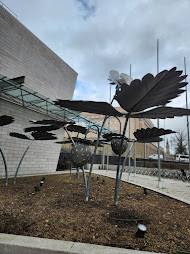First, the joy of Helsinki before I discuss what I have learned for the book project. It is on the Baltics, so when the wind blows, brrrrr. Yes, we got some snow here last night, deep into April. Makes me feel like I am back in Canada, except Ottawa has more sun and not as much cold winds. This is only my second time here, and the first one hardly counts as it was a brief layover between Leningrad (that tells you how long ago it was) and NY. I got used to tramming around town, never using the metro as everyone was very well located in the center except a couple of interviews--one requiring a bus ride to beyond Helsinki and one or two requiring cab rides.
 |
| Two parliament buildings and funky sculpture |
 |
| reindeer on potato |
Yes, Russia loomed large here, as the Finns have a strong memory of the trauma of the Winter War--their fight with the Russians during World War II. Apparently, the Ukraine war hit the old folks very hard. I did wonder where the bunkers are, as I had heard that civil defense is a big thing here. I didn't recognize the signs apparently, as I was told that pretty much all of Helsinki has underground facilities. The difference between old US bomb shelters and Finnish bunkers--the latter are used on a daily basis--parking lots, swimming pools, gyms, etc that are underground. This keeps them fresh, their air good, and also, most importantly, has the Finns comfy with going to these places. The economy is not doing well, and it may or may not have much to do with the fact that the Finns have pretty much cut off most trade with Russia.
The whole of government thing Canadians and others have a problem doing? Finland has whole of society, comprehensive security. In its history, it has always been alone until ... the last year. So, they are ready to mobilize the entire society if the Russians attack. This means a draft (just for men [all young men including one NBA player], women can join the military but their conscription is voluntary [holy oxymoron]), an extensive reservist system so that the small army can swell to 280,000 and then 900,000, coordination of all parts of society to respond to an attack. The drafted are paid about 5 Euros a day.... which does not go far in super expensive Helsinki.
 |
| Decorations inside Parl building |
In ye old comparative politics, the phrase is war made the state. While not entirely true, the idea is that societies developed more and more extensive political institutions in order to fight and win or survive in international relations. It may be the case that NATO membership has the same but smaller impact. That joining NATO has caused Finland has to dramatically enlarge and perhaps empower its very small Ministry of Defense. NATO requires meetings, document vetting, preparation, the sending of personnel to NATO hq's in Brussels, Mons, and elsewhere. AND most NATO policy is made by civilians even though NATO is far more an organization about military stuff than civilian stuff (hence why much of the effort to build an Afghan government was run by separate national governments (foreign affairs, development agencies) rather than by NATO. The relevance of this is that it gives the MoD a greater role in making defense policy than in the past. That is, the Finnish defense forces made much of the policies but that may be changing now. Oh, and it was the first EU country I have been in where the NATO flags easily outnumber the EU ones.
In terms of the project, Finland is an interesting case with a largely autonomous military, that their number two in the MoD is always a retired senior military officer, their MoD is tiny (150 now, swelling recently thanks to NATO), their President is commander in chief which means the military can try to sideline the MoD and the PM by insisting that the President is the one who oversees them, the President and PM have tiny foreign/security offices, and that conscription deeply shapes everything. Sweden will be a fun case to compare since the Swedes had a draft, dropped it, and have recently started it again while also joining NATO recently.
Random things I heard along the way:- five different Baltic pipelines have had "accidents" since the war in Ukraine started!
- Finland has reached 2% of GDP on defense because it frontloaded the cost of buying the F35s, which means that when that goes through the system, Finland may have a hard time procuring enough to keep at 2%.
- Womb chairs! Multiple waiting rooms in govt buildings reminded me of Oberlin's library way back in the day.
I do love my job even if it requires me to transcribe my interview notes. I have many more countries to visit and I still have to do some work to figure out the German case as well as write up the Finish case. All I know is that comparative civ-mil relations has been mighty good to me.
Next week, Mrs. Spew hits Europe, so we drive through Germany and then fly to Italy. So, a very different bit of fieldwork ahead. Much more focused on comparative cuisine.



No comments:
Post a Comment